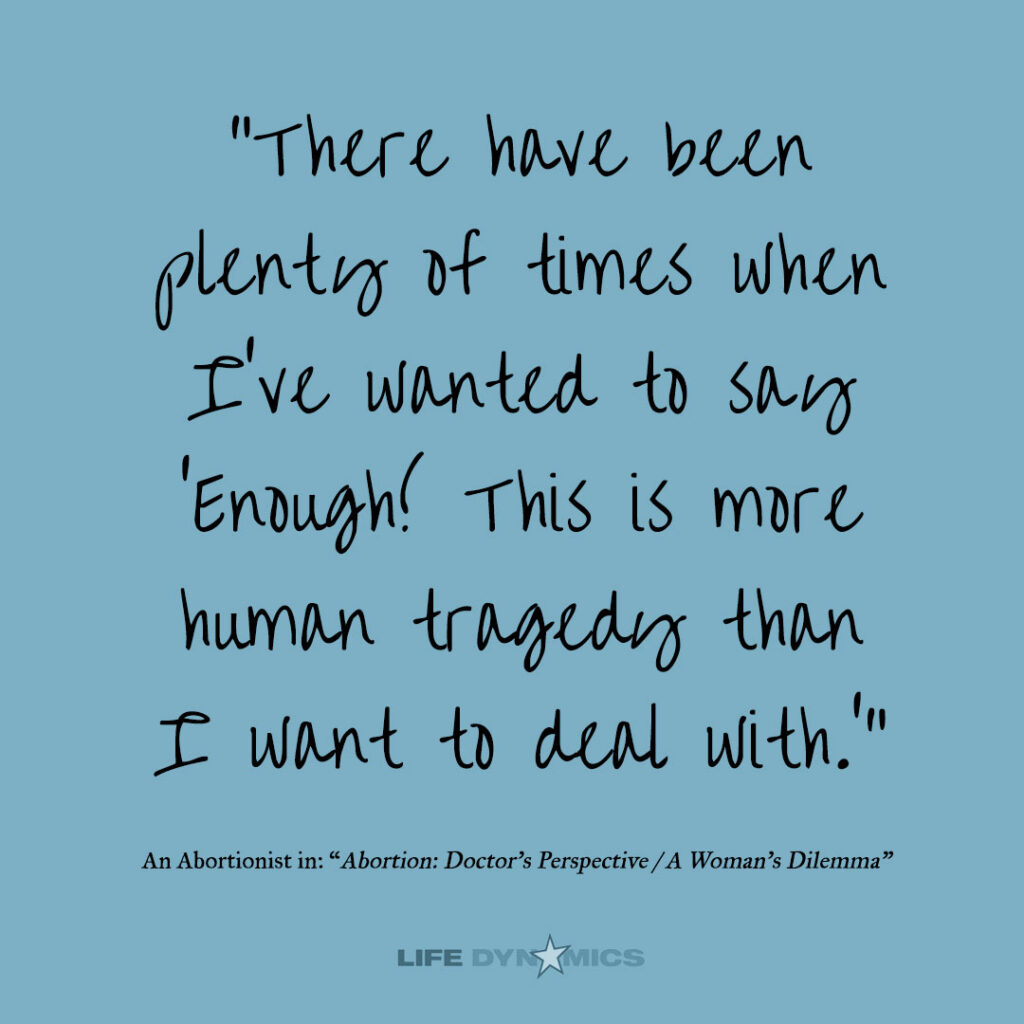No One Ever Says ‘Thank You’ To an Abortionist
In addition to their own aversion to the procedure, abortion providers also have to deal with the emotions of the women involved. And at times, this can profoundly rattle abortion clinic staff.
This article is a section pulled from chapter 5 of the book, Lime 5.
In addition to their own aversion to the procedure, abortion providers also have to deal with the emotions of the women involved.
Charlotte Taft, the former administrator of a Dallas abortion clinic, once observed that, “For many women nowadays, they’re angry that they had a choice. It’s too bizarre, but it’s like, ‘If you weren’t here, I wouldn’t have had to make this choice.’ And so, instead of feeling gratitude toward the physician and a sense of, you know, ‘You’ve helped me so much,’ a lot of times that woman [is] in her own pain or anger, or whatever, and the doctor may not get a lot of that [gratitude] these days. The woman herself may be anti-abortion.” When a woman doesn’t want an abortion, but simply accepts it as her fate, she is unlikely to feel any gratitude toward the one who provided it. As one doctor said, “No one ever says ‘Thank you’ to an abortionist.”
The woman may also be ungrateful because she felt forced into the abortion by a boyfriend, husband, parent, school teacher, or even the society that says abortion is bad, but offers her no options. She may even feel that society is telling her she has no right to have her baby because she is poor or because the baby is handicapped. Even hardcore abortion activists sometimes suggest that women have not only a right – but a responsibility – to abort. For example, abortion advocate Ann Taylor-Flemming once urged the pro-choice community to encourage more men to participate in the fight for legalized abortion by stating, “I dare say that many of them have impregnated women along the way, and been let off the hook in a big, big way; emotionally, economically, and every other way when the women went ahead and had abortions… The sense of relief for themselves was mixed with sympathy for, and gratitude towards those women, whose ultimate responsibility it was to relieve them of responsibility by having abortions… and it would sure be nice to hear from all those men out there whose lives have been changed, bettered and substantially eased because they were not forced into unwanted fatherhood.”
Another problem for abortionists is that there is seldom a conventional doctor-patient rapport.
To move as many women through the clinic as possible, the nurses and counselors completely prep the woman for abortion and oversee her recovery; the doctor is involved only during the actual procedure. According to abortionist David Grimes, the “communication may be limited to a brief discussion with the patient on the operating table before the surgery.” So there is little time to get to know the patient, or to allow the patient to see the doctor as anything more than someone who walks in a room, performs her abortion, and moves on to the next woman. Additionally, since the only service many abortionists provide is abortion, patients have no reason to come to him on a regular basis. They may return for a repeat abortion, but it’s not like there will be any regular contact established. Therefore, no loyal customer base, which is often important to maintain a healthy practice, can be maintained. In fact, a woman’s feelings about the abortion may cause her to purposely avoid him should she encounter him in a social environment.
Then there is the situation in which a woman immediately regrets her choice.
These cases can profoundly rattle the abortion clinic staff. During a workshop designed to allow abortion providers to talk about these problems, a nurse said she saw women “who had just had an abortion… lie in the recovery room and cry, ‘I’ve just killed my baby. I’ve just killed my baby.’ I don’t know what to say to these women. Part of me thinks, “Maybe they’re right.”

One abortionist, apparently tiring of the despair behind abortion, said “I don’t think there’s anyone doing abortions who hasn’t wished at some point that the situations creating the demand for them wouldn’t just go away. That includes me. There have been plenty of times when I’ve wanted to say, ‘Enough! This is more human tragedy than I want to deal with.'”
This article is a section pulled from the book, Lime 5. Lime 5 is an uncensored and fully documented look at the reality of legalized abortion, the people who do abortions, and the price women have been forced to pay for “the right to choose.” Get your copy for just $6.


Share This:
More Articles From Life Dynamics:
Zoning laws ignored for new Planned Parenthood abortion clinic
Pro-lifers in San Antonio, Texas say that city officials have given the green light to Planned Parenthood for it’s new $6.5 million abortion clinic in contrast to existing zoning laws which would have prohibited the renovations. Planned Parenthood of South Texas’ more than 22,000 square feet facility in the 2100 block of Babcock Road, is…
What Would You Give To Save A Life? #GivingTuesday
There are many ways your dollars help others, but this #GivingTuesday, we ask one simple and important question: What would you give to save a life?
#104 – Which Gender Supports Abortion More?
Pro-choice activists say that men have no right to express an opinion on abortion. But they may be running off their most loyal support group.